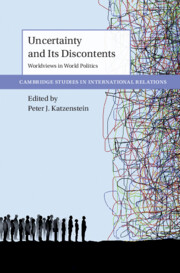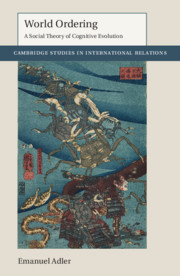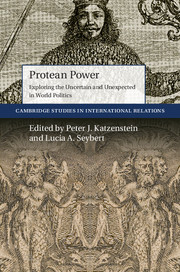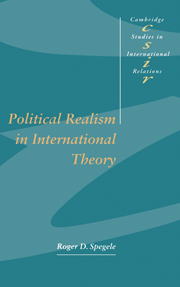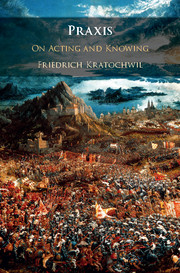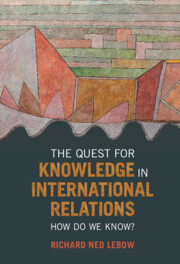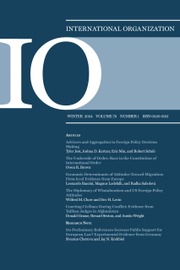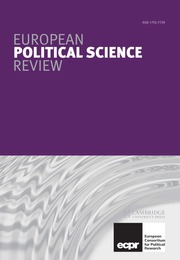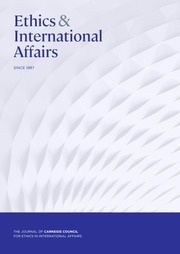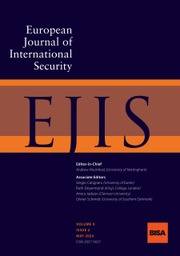Uncertainty and Its Discontents
Worldviews in World Politics
$105.00 (F)
Part of Cambridge Studies in International Relations
- Editor: Peter J. Katzenstein, Cornell University, New York
- Date Published: July 2022
- availability: Available
- format: Hardback
- isbn: 9781316512661
$
105.00
(F)
Hardback
Other available formats:
Paperback, eBook
Looking for an examination copy?
If you are interested in the title for your course we can consider offering an examination copy. To register your interest please contact [email protected] providing details of the course you are teaching.
-
Worldviews are the unexamined, pre-theoretical foundations of the approaches with which we understand and navigate the world, and this volume provides the first major study of worldviews in international relations. Advances in twentieth century physics and cosmology questioning anthropocentrism have fostered the articulation of alternative worldviews, rivalling conventional Newtonian humanism and its assumption that the world is constituted by controllable risks. This matters for accepting uncertainties that are an indelible part of many spheres of life including public health, the environment, finance, security and politics – uncertainties that are concealed by the conventional presumption that the world is governed only by risk. The confluence of risk and uncertainty requires an awareness of alternative worldviews, alerts us to possible intersections between humanist Newtonianism and hyper-humanist Post-Newtonianism, and reminds us of the relevance of science, religion and moral values in world politics. This title is also available as Open Access on Cambridge Core.
Read more- The first major study in international relations to explore the concept of worldview
- Highlights the constitutive role of uncertainty in world politics, and shows how it is neglected in conventional approaches that favor a risk-based style of analysis
- Characterizes four different worldviews (Newtonian and Post-Newtonian, humanist and hyper-humanist), illustrates them in four case studies, and reflects in four chapters on their advantages and limitations
- This title is also available as Open Access on Cambridge Core.
Reviews & endorsements
'As a most enlightening study on worldviews in world politics, this book explores the post-Newtonian multiverse full of uncertainties, potentialities and possibilities, challenging IR students to open up the Newtonian universe of the discipline where the rational belief in determinacy, control and causality dominates.' Yaqing Qin, Shandong University and China Foreign Affairs University
See more reviews'Uncertainty and Its Discontents: Worldviews in World Politics is the best book on worldviews since Max Weber's Economy and Society. In it, Katzenstein and collaborators explore the argument that the reason why IR scholars have so much difficulty integrating uncertainty into their scientific theories is their adherence to a mechanistic Newtonian scientific worldview, which natural scientists moved away from during the last century and instead adopted a post-Newtonian quantum/relationist scientific worldview. Although Katzenstein finally settled for a middle ground between both worldviews, and not all his collaborators agree that IR should make a sweeping turn in scientific worldviews, one day, perhaps soon, the book may be recognized as having played a role in starting a shift in how IR scholars do science. It should be read, therefore, not only by sympathizers to Katzenstein's views but particularly by scholars who still live in a mechanistic and predictable world of risk.' Emanuel Adler, University of Toronto
Customer reviews
Not yet reviewed
Be the first to review
Review was not posted due to profanity
×Product details
- Date Published: July 2022
- format: Hardback
- isbn: 9781316512661
- length: 320 pages
- dimensions: 235 x 158 x 27 mm
- weight: 0.71kg
- availability: Available
Table of Contents
Preface
1. Worldviews in world politics Peter J. Katzenstein
Part I. Substantialism and Relationalism:
2. Political worldviews in international relations: the importance of ideologies and foreign policy traditions Mark L. Haas and Henry R. Nau
3. Relationality, post-Newtonian international relations, and worldviews Milja Kurki
4. The president as mascot: relations all the way down Jairus Victor Grove
5. Jewish questions and Jewish worldviews Michael Barnett
Part II. Accountable Agents and Epistemic Engines:
6. Weberian and relationalist worldviews: what is at stake? Henry R. Nau
7. Oceans, jungles, and gardens: world politics and the planet Prasenjit Duara
Part III. Science and Religion:
8. Scientific worldviews in world politics: rationalization and the cosmological inheritance of the social sciences Bentley B. Allan
9. Religious worldviews in global politics Timothy A. Byrnes
Part IV. Conclusion:
10. Of gardens, forests, and parks Peter J. Katzenstein
Index.
Sorry, this resource is locked
Please register or sign in to request access. If you are having problems accessing these resources please email [email protected]
Register Sign in» Proceed
You are now leaving the Cambridge University Press website. Your eBook purchase and download will be completed by our partner www.ebooks.com. Please see the permission section of the www.ebooks.com catalogue page for details of the print & copy limits on our eBooks.
Continue ×Are you sure you want to delete your account?
This cannot be undone.
Thank you for your feedback which will help us improve our service.
If you requested a response, we will make sure to get back to you shortly.
×
